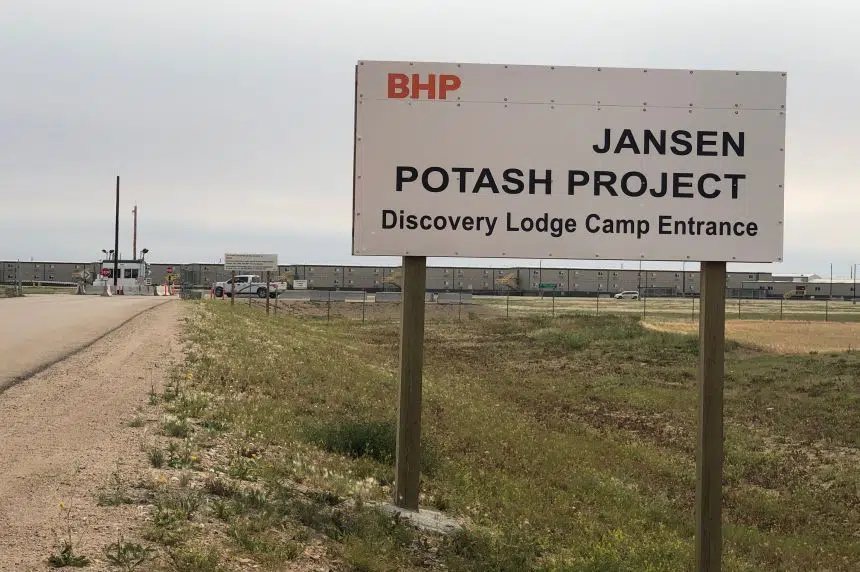BHP Potash will be hiring thousands of workers in the coming years to help build the Jansen Mine east of Saskatoon, and the search for some workers is already underway.
Giles Hellyer is BHP’s President of Potash. He says they’re looking in Saskatchewan of course, but also throughout Canada and around the world for qualified people.
“We look forward to people in Saskatchewan looking out for and applying for the many different roles that will be available at Jansen.”
“Because Saskatchewan is such a great province, people will also want to come here. We have a very exciting project that will attract people because of the size and the dimension. This is one of the largest resource projects going on in the country today and it’s certainly the largest single project that we’ve taken on in our entire 140 year plus history,” he said.
Right now, there are about 500 people working at the mine site, and there is room to house 2,500 in total.
Anyone pounding the pavement right now looking for work should not only look on BHP’s website for jobs, but should also pay attention to companies that are contracted by BHP to work at the mine.
“There’s many of them, actually. I’m sure people will find out who they are and they can make overtures to those companies. I think through online activities and knowing the companies that are there today that’s a great start. I think just keeping attuned to online postings will probably be one of the easier ways of doing that, ” he added.
There is already “relationships agreements” in place with local First Nations. Right now, 17 per cent of its work force is Indigenous.
Hellyer does anticipate that there will be competition for jobs between Nutrien, Mosaic and BHP in the coming years. But that comes with the territory he said – and he believes there will be enough incentives on the line to attract the people they want and need.
Competition between potash companies is a good thing
Dr. Keith Willoughby, Dean of the University of Saskatchewan’s Edwards School of Business, likens future competition between mining giants BHP, Nutrien and Mosaic to a rising tide that lifts all the boats.
“We have three important companies for this province that are very beneficial for an industry that’s crucial for our economic development and growth. So I see this as a positive way for those companies to compete for labour, compete for talent in this situation.”
“We are going to see this province become more of an attraction for people outside our jurisdiction….I think it also helps the psyche of this province,” he emphasized.
And he doesn’t anticipate a glut of potash on the world’s market.
Right now, Saskatchewan produces 20 million tonnes of potash, or more than 30 per cent of the world’s supply.
In the past few months, there’s also been a dramatic increase in the price of potash.
“A lot of it will depend on the future demand cycles of what’s going happen in post-pandemic situations. The benefit of potash though, is that it is so vital within the food value chain as a fertilizer so as our population continues to develop and it grows in certain areas of the world, people need food. So that’s where it’s an important commodity within a vital industry for us,” he added.
Willoughby says companies like BHP do their due diligence as they’re developing their projects- analyzing demand and assessing what they anticipate needs are going to be many years into the future. He adds that incentives from governments also help sweeten the pot.
Provincial government incentives
There are provincial government incentives available for big companies like BHP, Nutrien and Mosaic that have been in place for years, says Energy and Resources Minister Bronwyn Eyre.
Some of them have been in place for many years, and others were introduced less than one year ago. They include lowering the effective tax rate on new production and sales.
“These have been responsible for attracting over $20 billion in investment over the last 15 years – make that now $30 billion – with this announcement,” she said.
She said BHP will be paying the same amount of taxes and royalties over the life of the mine.
“We put back in place the exemption of PST for down-hole exploratory drilling, that was (in) 2019. We have R & D (research and development) credits that we put in place Dec. 2020. They improve opportunities in the potash sector around innovation so it’s tax credits of 40 per cent of eligible expenditures for R & D and market development. ”
Eyre says that was something BHP was positive about when they came out to Sasakatchewan. She says some incentives “morph and change” over the years, but they’re incentives have been around since the previous government.







